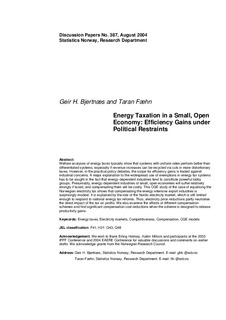Energy taxation in a small, open economy : efficiency gains under political restraints
Working paper

Åpne
Permanent lenke
http://hdl.handle.net/11250/180929Utgivelsesdato
2004Metadata
Vis full innførselSamlinger
- Discussion Papers [1002]
Sammendrag
Abstract:
Welfare analyses of energy taxes typically show that systems with uniform rates perform better than
differentiated systems, especially if revenue increases can be recycled via cuts in more distortionary
taxes. However, in the practical policy debates, the scope for efficiency gains is traded against
industrial concerns. A major explanation to the widespread use of exemptions in energy tax systems
has to be sought in the fact that energy-dependent industries tend to constitute powerful lobby
groups. Presumably, energy-dependent industries of small, open economies will suffer relatively
strongly if taxed, and compensating them will be costly. This CGE study of the case of equalising the
Norwegian electricity tax shows that compensating the energy-intensive export industries is
surprisingly modest. It is explained by the role of the Nordic electricity market, which is still limited
enough to respond to national energy tax reforms. Thus, electricity price reductions partly neutralise
the direct impact of the tax on profits. We also examine the effects of different compensation
schemes and find significant compensation cost reductions when the scheme is designed to release
productivity gains.
Utgiver
Statistics Norway, Research DepartmentSerie
Discussion Papers;No. 387Beslektede innførsler
Viser innførsler beslektet ved tittel, forfatter og emneord.
-
Did OPEC change its behaviour after the November 2014 meeting?
Boug, Pål; Cappelen, Ådne (Peer reviewed; Journal article, 2021)We analyse the behaviour of OPEC as a group by formulating a theoretical model that encompasses the perfect competition model and various forms of the imperfect competition model. By confronting the theoretical model with ... -
Konsummodellen i MSG6 ved økonomisk vekst : en analyse av utviklingen i energiforbruket og teknologisk endring
Bye, Brita; Gunnes, Trude; Larsen, Bodil Merethe (Rapporter;Nr. 2008/30, Report, 2008)Utviklingen i husholdningenes etterspørsel etter energivarer utgjør en viktig komponent i langsiktige økonomiske framskrivninger av norsk økonomi. Dette gjelder spesielt i framskrivninger av energibruk og konsekvenser ... -
MODAG –en makroøkonomisk modell for norsk økonomi
Boug, Pål; Dyvi, Yngvar; Johansen, Per Richard; Naug, Bjørn E. (Sosiale og økonomiske studier;108, Book, 2002)MODAG er en makroøkonomisk modell for norsk økonomi, utviklet i Statistisk sentralbyrå. Den benyttes særlig som analyseverktøy av Finansdepartementet, men brukes også av Statistisk sentralbyrå til egne analyser og til ...